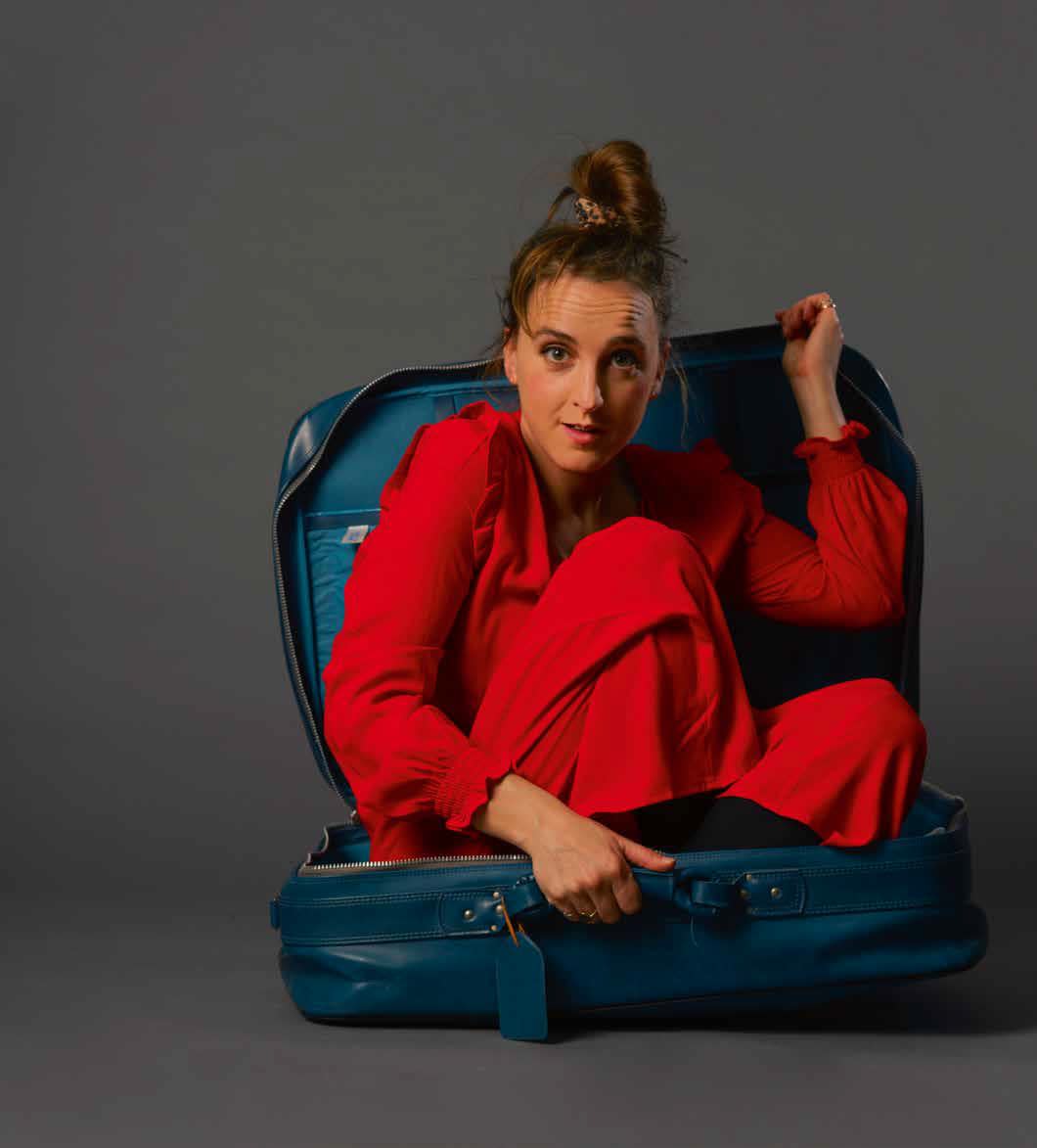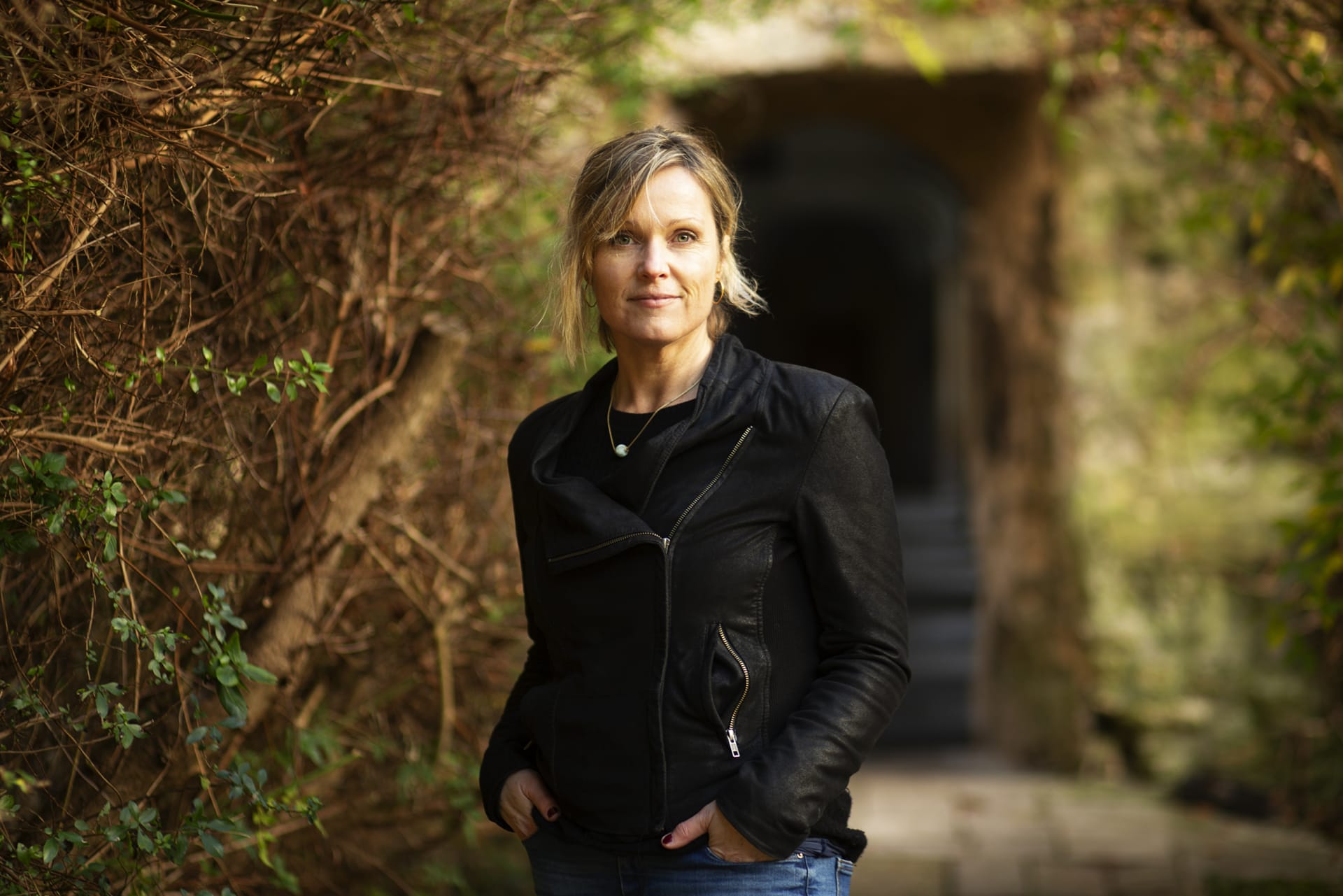I win a fiver on a scratch card moments before Lucy Pearman lights up my phone. She congratulates me on the chance windfall as I simultaneously go to laud her for her actually-deserved roles in Mister Winner and Red Dwarf. “Congratulations,” we chime in sync. The urge to shout ‘jinx padlock’ takes serious resistance. It would hardly have been conducive to an interview, plus I don’t know her middle name.
Mister Winner marks the second time she’s starred opposite Spencer Jones, having played his partner in the unrelentingly joyful, BAFTA-nominated, The Mind of Herbert Clunkerdunk. Lucy and Spencer are like two peas in a wonderful absurdist pod and I very much doubt this is the last time they’ll share the small screen. It seems their affinity contributed to the friendliness of the Mister Winner set, making the whole thing all the more surreal for the rising star. “Filming it was all friendly and normal, you know? Because I’m friends with Spencer I was like, ‘Oh this is nice’ – you don’t really think it’s going to be on telly.”
This feeling was compounded on the set of Red Dwarf. She’ll star in the new season of the cult comedy this Easter and it doesn’t seem like she can quite believe it. “It felt like I’d gone back in time and climbed in the telly,” she says incredulously. “It was ridiculously exciting and obviously I was star-struck again; I felt like the competition winner. I said to Craig Charles, ‘Why aren’t you having a croissant? They’re free!’”
Craft service aside, this wasn’t her maiden appearance in a TV studio having done spots on Harry Hill’s Clubnite and Alien Fun Capsule, shot in Elstree Studios. But Pinewood, home of the sci-fi sitcom, was a different kettle of fish. “Seeing a set like that built in these iconic film studios, that was like, ‘how has this happened to me?’” Her impostor syndrome seems quite genuine and it’s more than a little endearing. “It’s going to be on Dave,” she tells me helpfully. “You know, The Dave Channel – is that what you call it?” Her excuse for not knowing the name of the channel she’s to appear on checks out – “I’m from the country, we only get terrestrial channels.” And this isn’t the ‘from the country’ that you hear from wanky Londoners who’ve been to Scotland – she’s from the country with a capital C. Born and raised in Chipping Norton, her pride for the place is palpable. Her parents both come from farming families and her brother Toby runs a turkey farm. She’s the first to crack the creative side of things. “I think my dad would’ve loved to have been an actor, but there were fields to tend to.”
She feels lucky to have had their unwavering support despite how unwelcoming the industry can be, even as she went “up London.” Her 2017 Best Newcomer-nominated Fringe show Maid of Cabbage was partially based on the old-fashioned bumpkin idea that going to London is a huge event. Having bartended in Marsh Baldon, I can corroborate the exotic sense of otherworldliness that the big smoke evokes in the shire.
Three times during our chat she says she always “absolutely knew” she wanted to act. One gets the impression she wouldn’t have been deterred even if her family hadn’t been so encouraging and supportive. So keen was she in fact, that she lobbied Chipping Norton Youth Theatre to join a year early, aged seven. “I did the Chipping Norton pantomime in various guises,” she remembers happily, “I was a pippin about three times. I photocopied my first ever paycheque and blew it up. £35 – I was very excited.” It remained a feature throughout her life, returning to be a chaperone in university holidays. She speaks of it with the fondness of home and in no uncertain terms says, “I don’t think I’d be doing this if it wasn’t for that theatre.”
It’s tempting for someone in my position to make everything seem neat and linear when describing careers in showbiz. Of course the reality is less tidy and more piecemeal. Lucy and her double-act partner Letty Butler were first told to go to Edinburgh upon meeting the legendary director Steve Bendelack filming an advert. Once she turned her considerable talents towards comedy, momentum picked up. She tried for five years to get into drama school before earning a place at LAMDA, having already been through the National Youth Theatre and Bretton Hall. After LAMDA she fulfilled a long-held ambition to study with the enigmatic master clown and theatre professor Philippe Gaulier. He watches performances with a little drum in his lap and bangs it if you’re not funny.
“Oh yeah, he doesn’t hold back,” she replies when I say it all looks quite brutal, “but then this industry is quite brutal.” I ask what she learned from the French wizard and words don’t quite appear. “It’s really hard to explain, the whole clowning thing can be quite mercurial…” Was it formative? “Absolutely – he’s probably the greatest teacher I’ve ever worked with.”
She credits farm life with giving her a strong work ethic – something that’s come in handy at Edinburgh, where one year she did three shows a day. “I had no idea how hard it would be,” she says with a wide-eyed tone. “When I left university I worked for a theatre company in Spain. It was TiE – theatre in education. We were in a van driving across the Basque Country doing Dracula to Spanish children and we did three shows a day. That was quite hard. You’ve got to really love it.”
The same is true of the skin-thickening world of stand-up where her brand of absurdist, character-driven, prop-filled comedy has won her consistent acclaim. One line from a five-star review of her 2018 Fringe show, Fruit Loop stuck out to me. Written by Charlie Ralph of Broadway Baby, it said she was oxymoronic in that she represented a ‘niche for everybody’. What a lovely idea that is. I have a sense that we’re all overdue a bit of silliness these days. As I write we’re fending off floods and a pandemic, so two of the Biblical plagues (three if you count Boris Johnson) and a show about a worm that thinks it’s a caterpillar might just give us an hour of blessed relief. “It’s not my place to prescribe who needs what and when,” she says diplomatically, “but if anyone needs that, they can come to me.”
Lucy’s star is most certainly rising and, disregarding my Oxfordshire bias for a second, I think she’s set to become a much more regular feature on our screens and stages. It’s annoying when people overegg the ‘destined for greatness’ shtick, so I’ll be careful not to pile it on too thick.
If nothing else, I’d hate to jinx it.








